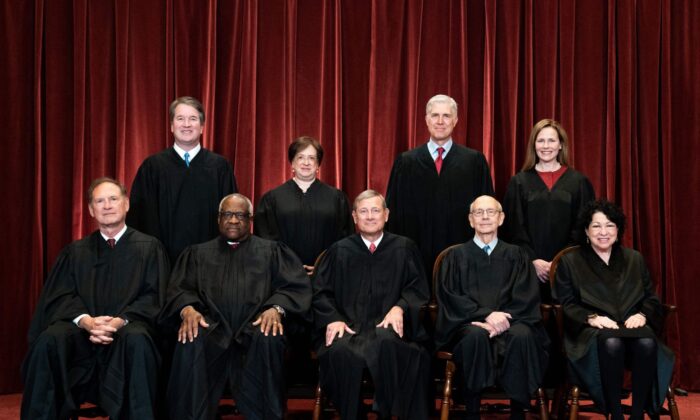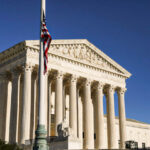By Matthew Vadum
The Supreme Court seemed receptive to arguments that New York state’s tough concealed-carry gun permitting system violates the Second Amendment during a court hearing on Nov. 3.
The legal challenge is important because it could result in a nationwide recognition of the right of Americans to possess guns outside the home, carrying guns in public places such as parks, schools, shopping malls, and churches.
The Supreme Court has been moving in the direction of strengthening Second Amendment protections in recent years.
In District of Columbia v. Heller (2008), the Supreme Court held that the Second Amendment protects “the individual right to possess and carry weapons in case of confrontation,” and in McDonald v. City of Chicago (2010), the court held that this right “is fully applicable to the States.”
The case comes amidst rising crime rates, activist demands to defund police departments, and a Biden administration push to strengthen gun control policies.
New York state’s gun permit law, like laws in seven other states, generally requires an applicant to prove “proper cause” in order to obtain a license to carry a concealed handgun in public.
The issue before the court is whether the state’s denial of the petitioning individuals’ applications for concealed-carry licenses for self-defense violates the Second Amendment, which states: “A well regulated Militia, being necessary to the security of a free State, the right of the people to keep and bear Arms, shall not be infringed.”
The case is New York State Rifle and Pistol Association v. Bruen, court file 20-843. The petition for certiorari, or review, was docketed Dec. 23, 2020. The court agreed April 26 to hear the appeal from the U.S. Court of Appeals for the 2nd Circuit.
The respondent, Kevin Bruen, is Superintendent of the New York State Police. Founded in 1871, the lead petitioner, the New York State Rifle and Pistol Association (NYSRPA), describes itself as “the state’s largest and nation’s oldest firearms advocacy organization,” and as the official National Rifle Association (NRA) affiliated state association in New York.
Only 70 minutes were scheduled for the hearing but arguments ran almost 2 hours, perhaps reflecting the importance of the constitutional rights under discussion. Justice Neil Gorsuch called in sick to work and participated in the hearing by telephone.
Representing the petitioners at the oral argument Nov. 3 was Paul Clement, who was U.S. Solicitor General in the second term of then-President George W. Bush.
Clement said the Constitution is on his clients’ side.
“The text of the Second Amendment enshrines a right not just to keep arms but to bear them, and the relevant history and tradition exhaustively surveyed by this court in the Heller decision confirmed that the text protects an individual right to carry firearms outside the home for purposes of self-defense,” he said.
That history “is so clear that New York no longer contests that carrying a handgun outside of the home for purposes of self-defense is constitutionally protected activity,” Clement said. “But that concession dooms New York’s law which makes it a crime for a typical law-abiding New Yorker to exercise that constitutional right.”
Justice Amy Coney Barrett asked New York Solicitor General Barbara Underwood if she believed the Heller case was correctly decided.
Underwood answered that she was “quite content to say it was rightly decided.”
Clement said New York likens its permitting law to laws restricting weapons in sensitive places “but the difference between a sensitive-place law and New York’s regime is fundamental.”
“It is the difference between regulating constitutionally protected activity and attempting to convert a fundamental constitutional right to a privilege that can only be enjoyed by those who can demonstrate to the satisfaction of a government official that they have atypical need for the exercise of that right.
“That is not how constitutional rights work. Carrying a firearm outside of the home is a fundamental constitutional right. It is not some extraordinary action that requires an extraordinary demonstration of need. Petitioners here seek nothing more than [what] their fellow citizens in 43 other states already enjoy and those states include some of the most populous cities in the country.”
Justice Sonia Sotomayor challenged Clement’s explanation of the history of concealed-carry restrictions.
“Those 43 states that you’re talking about, most of them didn’t give unrestricted rights to carry in one form or another until recent times. … I don’t know how I get past all that history you are, sort of, making it up and saying there’s a right to control states that has never been exercised in the entire history of the United States, as to how far they can go and say, ‘this poses a danger.’”
In questioning Underwood, Justices Samuel Alito and Brett Kavanaugh took aim at the seeming bureaucratic arbitrariness in New York’s granting of concealed-carry licenses.
If someone works late at night in high-crime Manhattan, why shouldn’t that person be able to get a concealed-carry permit, Alito asked.
That person cannot get a license where the fear of harm is “not particularized,” Underwood replied. “The core right to self-defense does not allow all to be armed for all possible confrontations in some places.”
“Proliferating guns in a populated area jeopardizes law enforcement,” she added.
“Why isn’t it good enough to say ‘I live in a violent area and want to be able to defend myself?’” Kavanaugh asked.
Having lots of concealed guns increases the chance of problems such as fights breaking out, Underwood said.
Arguing as a friend-of-the-court, the Biden administration urged the justices to uphold the New York law, which Principal Deputy U.S. Solicitor General Brian Fletcher said “is firmly grounded in the Second Amendment.”
Chief Justice John Roberts asked Fletcher why anyone should “have to convince somebody you’re entitled to exercise your Second Amendment right?”
“The idea that you need a license to exercise a right is unusual in the context of the Bill of Rights,” Roberts said.
Fletcher replied that in Texas and Tennessee in the 1800s “you had to show a need to carry.”






